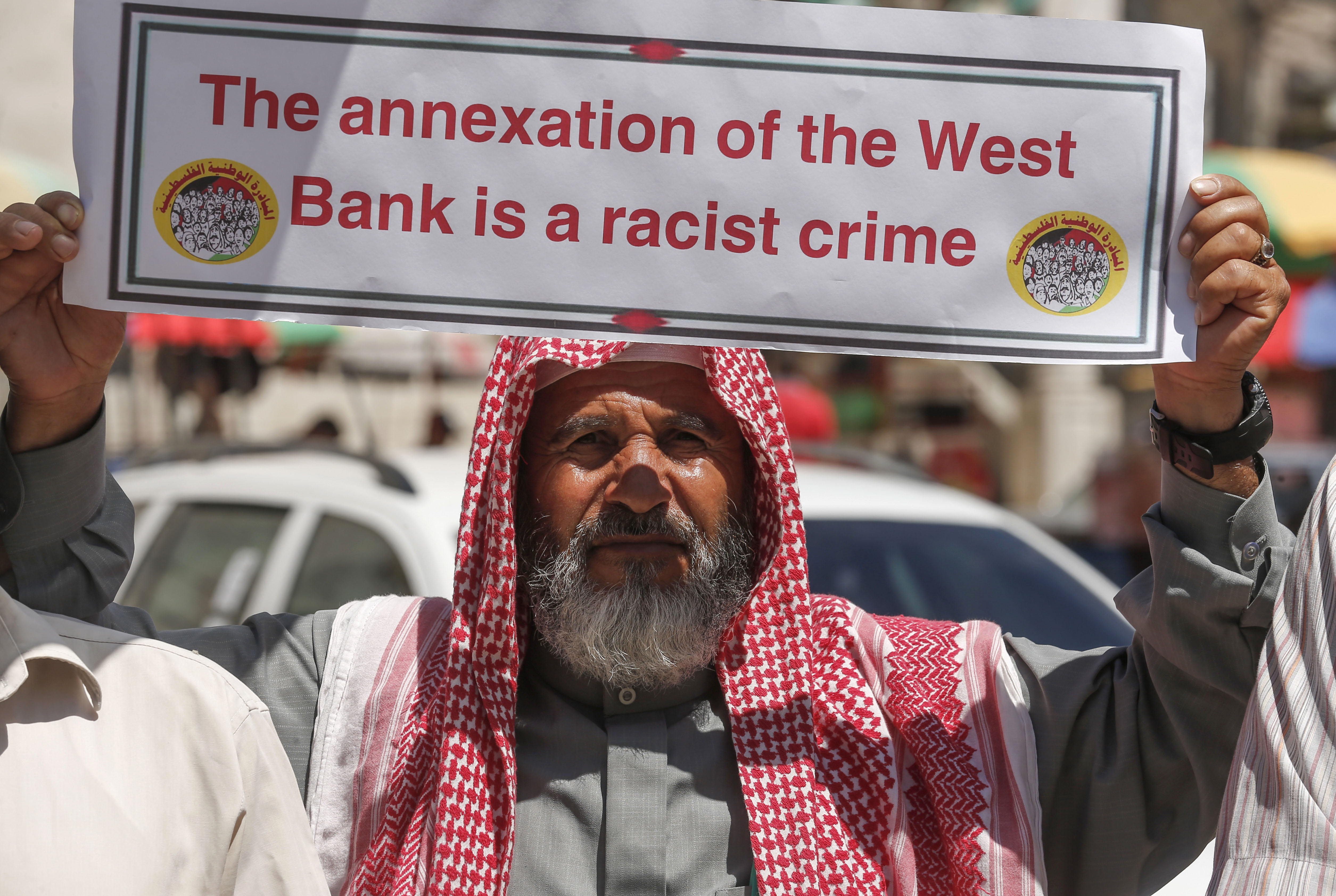Israel prefers a one-state solution that protects its colonial privileges
Published date: 29 July 2020 1
As there are three different arrangements for the 'one-state solution', which one of them does Israel have in mind for the Palestinian people?

Protesters gather in Tel Aviv's Rabin Square to denounce Israel's plan to annex parts of the occupied West Bank, on 23 June (AFP)
Talk of a "one-state solution" for the colonial situation in Palestine and Israel has intensified in recent weeks.
People from different mainstream national and political contexts, who had always supported the "two-state solution", have begun to voice support for one state. They do so due to their realisation that the "two-state solution" has become untenable.
But as there are three different arrangements for the "one-state solution", which one of them do they have in mind for the Palestinian people?
Three 'one-state solutions'
The failure of "the two-state solution", which was initially proposed by colonial Britain’s Peel commission in 1937 and formalised a decade later by the Western imperialist powers and the Soviet Union through the 1947 UN Partition Plan, has had drastic effects on the future of the Zionist settler-colony in Palestine.
The failure of 'the two-state solution' has had drastic effects on the future of the Zionist settler-colony in Palestine
The failure of the Zionist movement to entice the majority of European and American Jews to come to Palestine between 1897 and 1947 (or since) and its failure to acquire more than 6.5 percent of the land during that time necessitated an arrangement to establish a Jewish settler-colony on at least parts of Palestine, if not all of it.
Since 1967, billions of dollars have been spent to impose this "two-state solution" on the Palestinian people - which, it is important to point out, is only a solution to the Zionist failure to successfully colonise the whole country.
The capitulation of the Palestine Liberation Organisation (PLO) with the signing of the Oslo accords in 1993 was, according to the PLO, the crowning efforts of realising the "two-state solution" that legitimises Israel while granting a consolation prize to the PLO in the form of an ever-deferred mini-state.
For the Israelis, who essentially authored the accords, the Oslo deal was no more than a public relations stunt for the "two-state solution", while they secretly and not-so-secretly sounded the death knell for it, in preparation for the final "one-state solution".
What the Israelis have in mind is a one state, not unlike what European white colonists had achieved across the Americas, Africa and Oceania, since the late 18th century, namely domination of the natives through land theft and a series of draconian security arrangements legitimised by the signing of a series of treaties.
This is coupled with a PR campaign marketing the white supremacist states the colonists established as "democracies". These arrangements worked relatively well in the United States until the 1960s, when they had to be updated to be more effective in selling white supremacy to white Americans and to the rest of the world as the best form of "democracy".
This is, with some variations, what had transpired in Canada, Australia, and New Zealand.
The white-supremacist state
However, the white-supremacist one-state solution which worked well because of the effectiveness of genocide and slavery in establishing white demographic supremacy in the Americas and Oceania was less successful elsewhere, least of all in Africa.
The liberation struggles in three former settler-colonies (Algeria, Kenya and Rhodesia) established a state that is decolonised and deracialised and wherein white colonists would be equal citizens
The white-supremacist one state that French colonists of Algeria established in 1830 ultimately failed in 1962, as did the white-supremacist one state in Kenya and Rhodesia, in 1963 and 1980 respectively.
In Algeria, the white colonists numbered one million to nine million indigenous Algerians, while in Kenya, they numbered 23,000 to more than five million indigenous Kenyans, and in Rhodesia, whites numbered around 277,000 colonists to six million indigenous Zimbabweans.
In its place, the liberation struggles in all three former settler-colonies established a new version of the one-state solution - a state that is decolonised and deracialised and wherein white colonists would be equal citizens (although in Zimbabwe, the western imperialist countries insisted on guaranteeing the ill-gotten economic privileges for the white colonists for a couple of decades longer).
In all three cases, the colonists refused to live as equals and opted to repatriate to Europe or other white-supremacist settler-colonies, where their white racial privilege could be maintained and safeguarded.

The longest surviving white-supremacist one-state solution in Africa was in South Africa, whose white colonists opted for a white supremacist one-state solution while presenting their apartheid regime as an eleven-homeland solution (10 homelands for the indigenous Blacks and the rest of South Africa for the white colonists).
This would serve as the inspiration to the Israelis in authoring the Oslo accords, by which they established the Palestinian bantustans.
Israel annexation plan: A catastrophe begotten by a larger catastrophe
Read More »
But this arrangement also failed in South Africa and was finally transformed into a new colonial version of the one-state solution. The African National Congress accepted this in 1994, namely, a state where no decolonisation whatsoever would be effected and where the safeguarding of partial racialisation through the maintenance of economic white supremacy would be the price for overthrowing political white supremacy.
The difference between the white supremacist settler colonies in the US, Canada, New Zealand and Australia versus South Africa is demographic. Through genocide and slavery, white colonists established their demographic supremacy in their settler-colonies, which helped with the claim their rule was/is the rule of the democratic majority.
Opting out of the mass genocide strategy in South Africa meant that the one-state solution there was one wherein whites could only remain the economic, but not the political, rulers of the country, as they numbered 4.5 million people to about 36 million Blacks, Coloureds, and Indians, at the end of the apartheid regime.
The Palestinian dilemma
In Palestine, the dilemma of the Jewish colonists who constituted 10 percent of Palestine’s population after World War One and 30 percent after World War Two was how to establish a demographic majority short of genocide.
They opted for mass expulsion, a plan they had drawn up as early as the late 1920s and more formally after the mid-1930s. By the time they finished conquering Palestine in late 1948, they had expelled 90 percent of the Palestinian population in the Palestinian areas they conquered and established a Jewish-supremacist one state, in the American, Canadian, and Australian style.
After the 1967 Israeli conquest of the rest of Palestine, the demographics changed, which created a new set of problems.
Today, indigenous Palestinians (seven million-5.1 million in the West Bank and Gaza and 1.9 million in Israel) have again outnumbered their colonisers (6.7 million), not counting the eight million expelled Palestinian refugees living in Jordan, Syria and Lebanon within a 100-mile radius around their homeland.
This new situation necessitated the abandoning of the American-style, white-supremacist one state, replacing it with the apartheid South African-Bantustan-one-state style of rule, dubbed the “two-state solution”, formalised at Oslo.
But with the untenability of the two-state solution, some of its supporters outside Israel have been pushing for a post-apartheid, South-African-style one-state solution. Jordan’s Prime Minister Omar Razzaz, whose country recognised Israel’s right to be a Jewish settler-colony in the peace agreement signed in 1994, explained last week that Jordan could view positively a "one-state democratic solution" provided it gave equal rights to both peoples.
Zionists' one state solution
Meanwhile, liberal American Jewish Zionist pundit Peter Beinart has abandoned his support for the Jewish-supremacist two-state solution, and opted for one state.
Beinart, however, wants to reassure the Jewish colonists and their supporters that what he is calling for is not a decolonised and deracialised one state with equal political and economic rights for everyone, as independent Algeria, Kenya, and Zimbabwe had established but rather a post-apartheid, South Africa-style one state.
In a recent article, Beinart wrote "democratic binationalism in Israel-Palestine would be … enormously messy and complex. But Jews would be well positioned to defend their interests - perhaps so well positioned as to inhibit fundamental transformation. Compared to white South Africans, Israeli Jews boast much stronger transnational ties to a much stronger diaspora.
They’re also a far larger share of the population. When apartheid ended, South Africa was 12 percent white. Israel-Palestine is roughly 50 percent Jewish. And even if the Jewish share of the population fell as the result of emigration, [Palestinian] refugee return, and a lower birth rate, the experience of South Africa and the US-where political equality has only marginally remedied the economic chasm between the historically privileged and the historically oppressed - suggests that Jewish economic privilege would endure."

Beinart understands well that Jewish colonists in Palestine/Israel, like white colonists elsewhere, would leave the country if they lost white Jewish privilege and submitted to decolonisation and to equal rights with the natives, which is why he insists that "in an equal country", as in post-apartheid South Africa where whites continue to prosper as economic rulers, "Jews could not merely survive, but prosper".
Yet, and for fear of this eventuality, more than one million Israeli Jews obtained dual nationalities in the last two decades, with the second nationality being invariably European or American.
These are countries that, were Israeli Jews to emigrate back to, would safeguard their white privilege (it is notable that Beinart’s own parents were white South African settlers who moved to that other white supremacist settler-colony across the Atlantic, where he was born).
End of colonial privileges
Supporters of Israel fear all three one-state solutions but not in equal measure. They fear the apartheid one-state solution because it would lose Israel international support and open it up to sanctions; they fear the Algeria-Kenya-Zimbabwe solution most of all because it would lose the Jewish colonists all their colonial and racial privileges by making them equal to the natives.
Unless the one-state solution nullifies all Jewish racial and colonial privileges, it would be yet another PR campaign
That some of them now support the post-apartheid South African-style, one-state solution is their new compromise, as it seems to be the only one of the three that can safeguard Jewish supremacist privilege without international sanctions.
Let no one be fooled, unless the one-state solution nullifies all Jewish racial and colonial privileges and decolonises the country in order to grant equal rights to all, it would be yet another PR campaign to cover up the maintenance of Jewish supremacy under a new guise.
The views expressed in this article belong to the author and do not necessarily reflect the editorial policy of Middle East Eye.


0 Comments:
Post a Comment
Subscribe to Post Comments [Atom]
<< Home